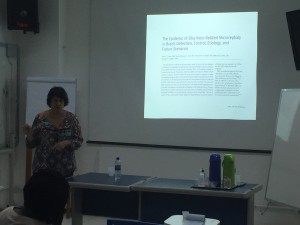What an interesting time to be in Brazil! The Brazilians are facing many challenges, yet in the face of adversity they continue to smile and look for the best in their situation.

We started our day with Professor Maria Gloria Teixeira, the “rock star” of mosquito-borne illness in Brazil. Professor Teixeira published the article in the AJPH describing the link between Zika and microcephaly. She was also instrumental in finding the epidemiologic link to the original source of Zika virus in Brazil. She explained the challenges of identifying, treating and preventing the trio of viruses that are currently being transmitted here – Dengue, Chikungunya, and Zika. All three have similar symptoms and are spread via mosquitoes, so surveillance has been a real challenge. We learned that Aedes aegypti is the main “villain” in this pandemic, but Aedes albopictus is an accomplice. While it took Dengue several decades to spread, chikungunya and Zika spread in only one year. The burden of these diseases on the healthcare system of Brazil is substantial and not yet fully known. Professor Teixeira found hope in the fact that unlike Dengue and Chikungunya, Zika has only one serotype, so an effective vaccine will likely be developed. In the meantime, messages of hope and prevention are promoted by the Zika Zero campaign.

Instead of returning home for lunch, we had a delicious meal with the faculty of the Institute of Collective Health as we talked informally about our experiences thus far in Brazil. After lunch, Dr. Stauber gave an interesting presentation on Atlanta’s Proctor Creek Watershed. She was amazing as she served as her own interpreter, presenting in both English and Portuguese! The faculty members attending were especially interested in the PhotoVoice methodology, which was completely new to them.
Finally, we were invited to visit the UFBA Hospital, which is on the same campus as the Institute. We had the opportunity to talk candidly with two doctors at this federally-funded university hospital. We came away with a better understanding of the strengths and challenges of the Unified Health System (SUS) from the perspective of health practitioners. Of course, funding and resources are a major concern. There is also a shortage of primary care providers. Despite these challenges in implementation, the doctors still believe in the SUS system’s ideology.
This was another day full of learning and insights. We are all so grateful to our partners here and the Georgia State University School of Public Health for giving us such a wonderful opportunity!
We’re off to the beach tomorrow for some well-earned R&R!
-Connie Russell